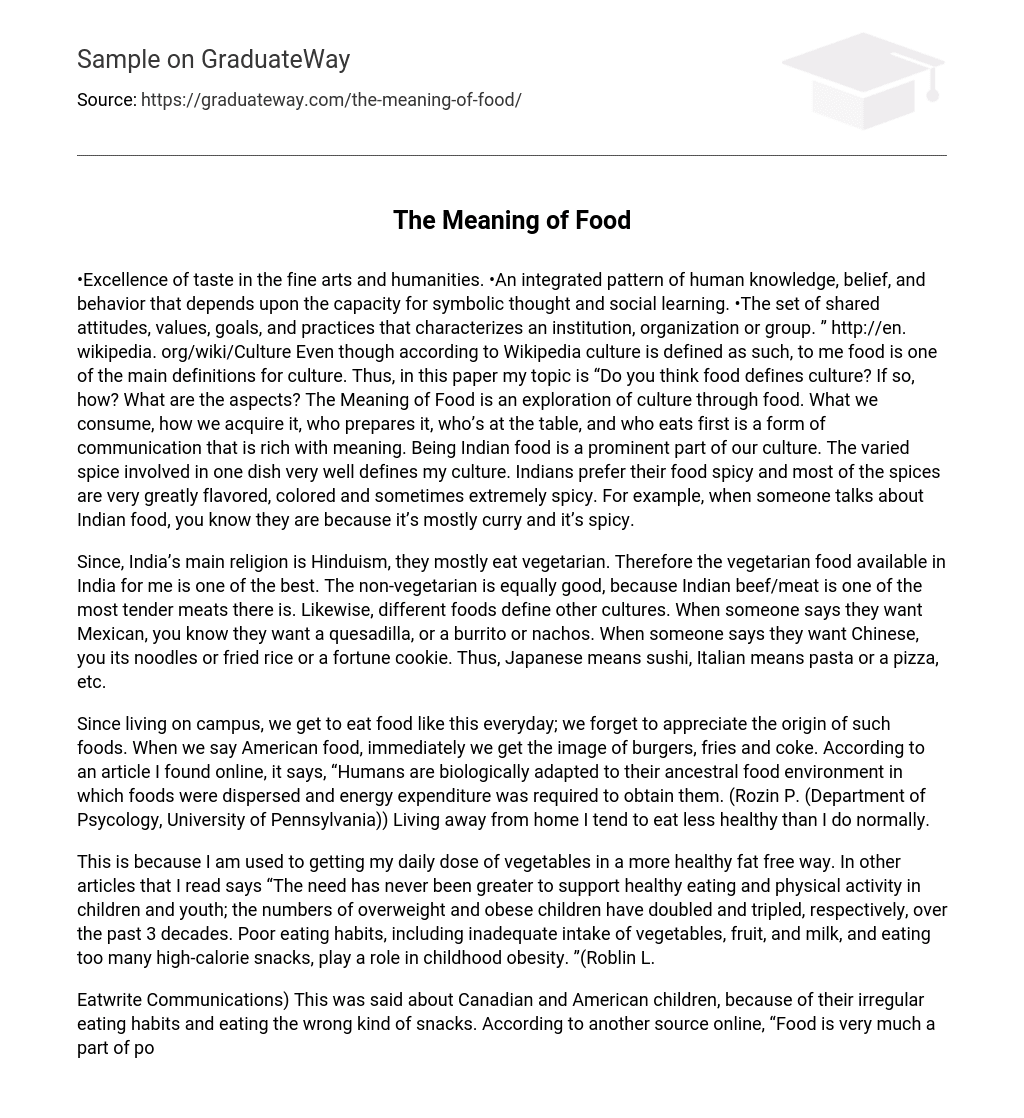Even though according to Wikipedia culture is defined as such, to me food is one of the main definitions for culture. Thus, in this paper my topic is “Do you think food defines culture? If so, how? What are the aspects? The Meaning of Food is an exploration of culture through food. What we consume, how we acquire it, who prepares it, who’s at the table, and who eats first is a form of communication that is rich with meaning. Being Indian food is a prominent part of our culture.
The varied spice involved in one dish very well defines my culture. Indians prefer their food spicy and most of the spices are very greatly flavored, colored and sometimes extremely spicy. For example, when someone talks about Indian food, you know they are because it’s mostly curry and it’s spicy.
Since, India’s main religion is Hinduism, they mostly eat vegetarian. Therefore the vegetarian food available in India for me is one of the best. The non-vegetarian is equally good, because Indian beef/meat is one of the most tender meats there is. Likewise, different foods define other cultures. When someone says they want Mexican, you know they want a quesadilla, or a burrito or nachos. When someone says they want Chinese, you its noodles or fried rice or a fortune cookie. Thus, Japanese means sushi, Italian means pasta or a pizza, etc.
Since living on campus, we get to eat food like this everyday; we forget to appreciate the origin of such foods. When we say American food, immediately we get the image of burgers, fries and coke. According to an article I found online, it says, “Humans are biologically adapted to their ancestral food environment in which foods were dispersed and energy expenditure was required to obtain them. (Rozin P. (Department of Psycology, University of Pennsylvania)) Living away from home I tend to eat less healthy than I do normally.
This is because I am used to getting my daily dose of vegetables in a more healthy fat free way. In other articles that I read says “The need has never been greater to support healthy eating and physical activity in children and youth; the numbers of overweight and obese children have doubled and tripled, respectively, over the past 3 decades. Poor eating habits, including inadequate intake of vegetables, fruit, and milk, and eating too many high-calorie snacks, play a role in childhood obesity. ”(Roblin L. Eatwrite Communications)
This was said about Canadian and American children, because of their irregular eating habits and eating the wrong kind of snacks. According to another source online, “Food is very much a part of popular culture, and the beliefs, practices, and trends in a culture affect its eating practices. Popular culture includes the ideas and objects generated by a society, including commercial, political, media, and other systems, as well as the impact of these ideas and objects on society. (Judith C. Rodriguez)
Dietary habits are the habitual decisions a person or culture makes when choosing what foods to eat. Certain foods define religion too, because of their different customs and traditions. For example, the Muslims only eat Halal meat. This is a special type of meat that is prayed upon before it cut/sacrificed. In the same way Judaism permits only kosher foods. One of the textbooks for the course is “Omnivores’ Dilemma,” by Michael Pollan.
In an interview conducted by the Los Angeles CityBeat one of the questions asked was, “In The Omnivore’s Dilemma, you talk about how eating is, in many cultures, a positive act and part of building a community. ” Pollan’s reply to the question was, “It’s a way you build community, it is part of culture, and it helps define culture. To think what it means to be French in the absence of French food, or to be Italian in the absence of Italian food, you’d be missing a big part of [the culture]. ” Thus we see Pollan supports the fact that food does define culture.
Around the world it is not just cooking food, but there are various other things you can do with food that defines culture. For example, there’s something called the “Korean’s cup. ” This is a famous sixty-minute hot dog/steak meat-eating contest, which is held in Seoul on New Year’s Day. The Korean’s take great pride in this “dog-eating,” culture, as it is the slogan of Korea’s Cup. Living in the twenty first century we often forget to appreciate the origin of many foods. In America itself you get a variety of dishes just a street away.
Here has been an increased incorporation of ethnic cuisines into the American diet, including foods from Asia, the Middle East, and Latin America. This trend is part of a larger movement toward diversity in all aspects of life. Judith C. Rodriguez also says, “Although all humans need food to survive, people’s food habits (how they obtain, prepare, and consume food) are the result of learned behaviors. These collective behaviors, as well as the values and attitudes they reflect, come to represent a group’s popular culture. ”





